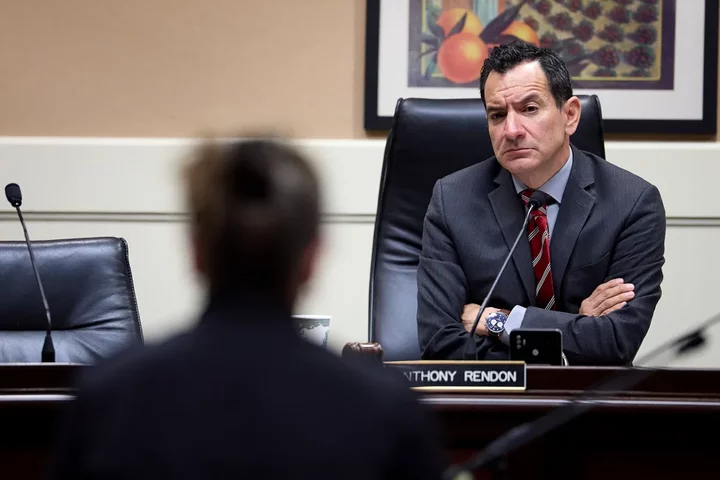Assemblymember Anthony Rendon, chairperson of the Select Committee on Happiness and Public Policy Outcomes, listens to a speaker during a hearing at the state Capitol in Sacramento on March 12, 2024. Photo by Fred Greaves for CalMatters
Can California legislate its way to happiness?
Former Assembly Speaker Anthony Rendon is committed to trying, though he puts his own happiness at only two out of 10 (ask him again after November, he told CalMatters).
After being forced to hand over his leadership post last summer, the Lakewood Democrat became the chairperson of the newly formed Select Committee on Happiness and Public Policy Outcomes, telling Politico last October that lawmakers “don’t take happiness seriously.”
At the committee’s first meeting Tuesday, Rendon said he was inspired to take on the topic after watching the 2011 documentary “Happy” 14 times in a two-day period. This committee is at least 11 years in the making, he said.
Roko Belic, the filmmaker and first witness in the three-hour hearing, said from his visits to 14 countries, the keys to happiness are nurturing strong interpersonal and communal relationships; leading a life that includes meaning, play or novelty; and a sense of gratitude. Other experts also mentioned economic stability (but not necessarily economic wealth); a connection to the environment; and resilience.
How happy are Californians?
Mark Baldassare, the Public Policy Institute of California’s survey director, cited the organization’s September 2023 survey, which found 58% of Californian adults said they were “pretty happy,” 16% “very happy” and 26% “not too happy.” But with the number of “not too happy” Californians growing, Baldassare suggested that legislators should “pay attention” to younger adults and lower-income residents who were less happy than others.
California comes in seventh for the happiest U.S. state according to WalletHub, and three of its cities appear in the top five happiest, with Fremont topping the list overall. Fremont Mayor Lily Mei was invited to the hearing and touted the city’s “vibrant” cultural community, economic opportunities and inclusivity.
So how to get to a happier place?
In addition to abstract theories that were tossed around — including nods to Buddhism, Aristotle and Maslow — panelists floated some potential policy solutions. These ranged from the very ambitious (universal healthcare) to the more minor (increasing urban green spaces).
And while Rendon told CalMatters that not all ways to boost happiness would be a “government directive,” a country that ranks high in happiness with a strong social safety net “pretty much jives with my political ideology.”
The hearing was, for the most part, optimistic: Panelists espoused how increasing happiness benefited the greater good: Happy people live longer, are healthier, more successful at work and are more likely to volunteer.
But at times, the grave consequences of an unhappy public came to the forefront — particularly when legislators spoke about the “ripple effects” on mental health, depression and crime.
Said Assemblymember Pilar Schiavo, a Santa Clarita Valley Democrat and committee member: “You don’t have kids walking into schools with guns to shoot people if they’re happy, you know?”
###
CalMatters.org is a nonprofit, nonpartisan media venture explaining California policies and politics.

CLICK TO MANAGE